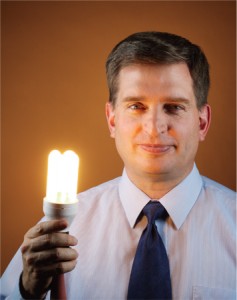A Q&A with Thomas Fletcher who directs the university’s Advanced Combustion Engineering Research Center

Using fluorescent light bulbs is one of many ways Thomas Fletcher suggests conserving energy.
Thomas H. Fletcher (BS ’79) leads a high-powered life. After working for Sandia National Labs for seven years, he came to BYU, where he has taught combustion for nearly 16 years. Fletcher also directs the university’s Advanced Combustion Engineering Research Center, which works with industry leaders to produce cleaner and more efficient energy.
Q: How can I conserve electricity and gas around the house?
A: Most of the energy we use goes into heating and cooling our houses and to the water heater, so target ways to cut down on those. Get a thermostat that changes the temperature when you’re asleep. Or when it’s nice at night, get a fan to blow hot air out of the house instead of relying on the air conditioner. Seal any cracks or drafts around the doors and windows. You can also wrap your water heater in insulation, get a low-flow showerhead, and do your laundry in cold water.
Q: What about other energy consumers around the house?
A: You can save a little by turning off your computers at night and unplugging chargers. Use compact fluorescent bulbs. They’ll each save you $30 over the life of the bulb, including the extra cost of the bulb. There are tradeoffs, though: they give out a little less light.
Q: Are hybrid cars a good idea?
A: You have to decide what your priorities are—do you want to save as much energy as possible or as much money as possible? With a hybrid car, you can get 50 miles to the gallon, so you’re saving a lot of energy, but you pay a lot more for the car. You’d have to drive it 300,000 miles to make up the price difference. But they certainly burn less fuel.
Running low on answers? BYU has experts in just about everything. Submit your questions for the “Ask an Expert” column to askanexpert@byu.edu.
Find more energy-saving tips at energy.gov.






